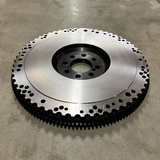Differential gear - What is it and what types are there?

Here you get an overview of how a differential gear work and what different types there are.
It is divided into the following categories:
- What is a differential gear?
- LSD / Torsendifferential
- Multi-plate differential
- Weld-lock differential
1 ▼
What is a differential gear?
Differential gear is a device consisting of gears that can distribute power at an angle (usually 90 degrees). This is used to distribute power from the engine to the vehicle's wheels. When the car turns, the outer wheels will travel a longer distance and therefore need to spin faster than the inner wheels. A differential or "open diff" as it is called thus allows us to turn without problems.
Since wheels on one axel can spin at different speeds and are not locked, only one wheel can therefore lose grip if it is slippery. The power from the engine will then be transferred more to the wheel that spins faster. In a performance context, this is not advantageous as power is distributed to a spinning wheel and not to the wheels that have grip.
If you want more grip, this must be countered with a different type than "open" differential gear. The different types are Torsendifferential, LSD or a welded open differential gear called a Weld-lock differential.
Det finns även konisk och hypoidväxel men dessa är olika versioner av en differentialväxel.
2 ▼
LSD / Torsen differential
(Helical LSD)
Torsen differential (Abbreviation of TORque SENsing) is a popular, durable and cost-effective solution that counteracts spinning wheels. This solution instead shifts the power to the wheel with the best grip.
If a wheel is completely in the air when, for example, turning on a track or has very little resistance, the differential will not work properly. Some kind of torque is needed, a larger preload makes the differential work "better" but not completely in these situations.
This type of differential comes with a factory "preload", it is not possible to say exactly how it will behave other than that it is much better than the open differential gear in racing / motorsport.
Oil: 80-90 or 80-140 Petrolium based oil (Not synthetic)
Benefits:
- Very low maintenance
- Low noice to no noise
- Low cost
Disadvantages:
- Doesn't work well if a wheel is in the air / has a very poor grip..
- Very little or no adjustment
Type of differential action:
The Torsen works the opposite of an open diff. This sends the power to the wheel that has the most grip for performance / off road. The more torque created, the more friction / locking is generated in the differential. So you can't say that a torsend diff lock the wheels, it drives the wheel with the most grip instead.
Malfunction / noice from a torsen differential usually depend on the type of oil used, so be sure to choose a proven oil for your diff.
3 ▼
Multi-plate differential
(Plated LSD)
A disc differential consists, as the name suggests, of friction discs.
When a wheel on one axle loses grip and starts spinning faster, this tightens / increases the pressure on the friction discs, which transfer more power to the other wheel.
Due to adjustability and function, a multi-plate differential is advantageous in motorsport / racing.
Oil: LSD oil
Benefits:
- Great adjustability
- Slows down with one wheel in the air but it still work
Disadvantages:
- More maintenance / Wear than open diff or Torsen
- More noise than an open diff or Torsen
- Higher costs
Type of differential action:
A multi-plate differential equalizes the differential action so that both wheels should spin at the same speed by tightening the multi-plate disc package. More preload / load and the wheels spin % more equally fast.
4 ▼
Weld-lock differential
A so-called welded differential (Welded open differential gear) is a budget solution that locks a pair of wheels together on one axle. Tight turns become problematic because the gears are welded together so the wheels cannot move individually (explained in part 1).
It is rarely good to have a welded differential as the car will always counteract turning and strive straight ahead.
If one wheel on an axle in an individual suspension gets a poor grip, all the power will end up on that drive axle and this will cause extra high wear.
Oil: Standard / Original
Benefits:
- Costs nothing more than an oil change
- 100% locked -always.
Disadvantages:
- Impairs turn
- Greater wear on wheel suspension and driveline
Welded differential is not recommended but only included for comparison.











































